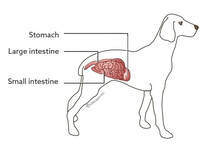
Canine Coronavirus Disease in Dogs
By Rania Gollakner, BS, DVM, MPH; Ernest Ward, DVM
What is canine coronavirus disease?
Canine coronavirus disease, known as CCoV, is a highly infectious intestinal infection in dogs, especially puppies. Canine coronavirus is usually short-lived but may cause considerable abdominal discomfort for a few days in infected dogs. The virus is from the Coronaviridae family. The virus gets its name from the fact that when viewed from above under an electron microscope, the virus has a ring of projections that appear like a coronet, or a small crown made of ornaments fixed on a metal ring. There are many types of coronavirus, each affecting different animal species, including humans.
"Canine coronavirus (CCoV) is not the same virus as SARS-CoV-2 that causes the novel coronavirus (COVID-19)."
Canine coronavirus (CCoV) is not the same virus as SARS-CoV-2 that causes the novel coronavirus (COVID-19). CCoV does not affect people. CCoV causes gastrointestinal problems in dogs, as opposed to respiratory disease.
See the handout “SARS-CoV-2 (COVID-19)” for information on the disease caused by SARS-CO-V-2.
How is canine coronavirus transmitted?
Most cases of canine coronavirus are contracted by oral contact with infected fecal matter. A dog may also become infected by eating from contaminated food bowls or by direct contact with an infected dog.
"Crowding and unsanitary conditions favor transmission."
Crowding and unsanitary conditions lead to coronavirus transmission. The incubation period from ingestion to clinical signs is one to four days. The duration of illness is two to ten days in most dogs. Secondary infections by bacteria, parasites, and other viruses may develop and prolong illness and recovery. Dogs may be carriers of the disease for up to six months (180 days) after infection.
What are the signs of canine coronavirus?
Most canine coronavirus infections are sub-clinical and produce few clinical signs in dogs. Occasionally an infection may cause more severe symptoms, particularly in young puppies. The most typical sign associated with canine coronavirus is diarrhea, typically sudden in onset, which may be accompanied by lethargy and decreased appetite. The stool is loose, with a fetid odor and orange tint. It may contain blood or mucus. If a puppy has a mixed infection, for instance both coronavirus and parvovirus (see handout "Parvovirus in Dogs"), the illness will be more severe.
Are there diseases that can be confused with canine coronavirus?
There are many causes of diarrhea in dogs. Severe cases of coronavirus can be easily confused with parvovirus, and they may occur at the same time. Be sure to see your veterinarian if your dog has diarrhea that does not resolve within twenty- four hours or is associated with significant lethargy or loss of appetite.
Is there any treatment?
There is no specific treatment for canine coronavirus.
"Antibiotics are ineffective against viruses, but may be useful in controlling secondary bacterial infections."
Antibiotics are ineffective against viruses, but may be useful in controlling secondary bacterial infections. Withholding food for twenty-four hours after diarrhea ceases and gradually reintroducing small amounts of food may be the only required treatment. A dehydrated patient may require intravenous fluids to correct the fluid and electrolyte imbalances. Early medical intervention is the key to successful treatment of severe cases.
What about vaccines?
Canine coronavirus vaccines are available. This vaccine is not recommended for all dogs and will be administered based on your dog's lifestyle and risk assessment. This vaccine will only work for the CCoV type of coronavirus. It is not effective for the prevention of COVID-19.
By Rania Gollakner, BS, DVM, MPH; Ernest Ward, DVM
What is canine coronavirus disease?
Canine coronavirus disease, known as CCoV, is a highly infectious intestinal infection in dogs, especially puppies. Canine coronavirus is usually short-lived but may cause considerable abdominal discomfort for a few days in infected dogs. The virus is from the Coronaviridae family. The virus gets its name from the fact that when viewed from above under an electron microscope, the virus has a ring of projections that appear like a coronet, or a small crown made of ornaments fixed on a metal ring. There are many types of coronavirus, each affecting different animal species, including humans.
"Canine coronavirus (CCoV) is not the same virus as SARS-CoV-2 that causes the novel coronavirus (COVID-19)."
Canine coronavirus (CCoV) is not the same virus as SARS-CoV-2 that causes the novel coronavirus (COVID-19). CCoV does not affect people. CCoV causes gastrointestinal problems in dogs, as opposed to respiratory disease.
See the handout “SARS-CoV-2 (COVID-19)” for information on the disease caused by SARS-CO-V-2.
How is canine coronavirus transmitted?
Most cases of canine coronavirus are contracted by oral contact with infected fecal matter. A dog may also become infected by eating from contaminated food bowls or by direct contact with an infected dog.
"Crowding and unsanitary conditions favor transmission."
Crowding and unsanitary conditions lead to coronavirus transmission. The incubation period from ingestion to clinical signs is one to four days. The duration of illness is two to ten days in most dogs. Secondary infections by bacteria, parasites, and other viruses may develop and prolong illness and recovery. Dogs may be carriers of the disease for up to six months (180 days) after infection.
What are the signs of canine coronavirus?
Most canine coronavirus infections are sub-clinical and produce few clinical signs in dogs. Occasionally an infection may cause more severe symptoms, particularly in young puppies. The most typical sign associated with canine coronavirus is diarrhea, typically sudden in onset, which may be accompanied by lethargy and decreased appetite. The stool is loose, with a fetid odor and orange tint. It may contain blood or mucus. If a puppy has a mixed infection, for instance both coronavirus and parvovirus (see handout "Parvovirus in Dogs"), the illness will be more severe.
Are there diseases that can be confused with canine coronavirus?
There are many causes of diarrhea in dogs. Severe cases of coronavirus can be easily confused with parvovirus, and they may occur at the same time. Be sure to see your veterinarian if your dog has diarrhea that does not resolve within twenty- four hours or is associated with significant lethargy or loss of appetite.
Is there any treatment?
There is no specific treatment for canine coronavirus.
"Antibiotics are ineffective against viruses, but may be useful in controlling secondary bacterial infections."
Antibiotics are ineffective against viruses, but may be useful in controlling secondary bacterial infections. Withholding food for twenty-four hours after diarrhea ceases and gradually reintroducing small amounts of food may be the only required treatment. A dehydrated patient may require intravenous fluids to correct the fluid and electrolyte imbalances. Early medical intervention is the key to successful treatment of severe cases.
What about vaccines?
Canine coronavirus vaccines are available. This vaccine is not recommended for all dogs and will be administered based on your dog's lifestyle and risk assessment. This vaccine will only work for the CCoV type of coronavirus. It is not effective for the prevention of COVID-19.
